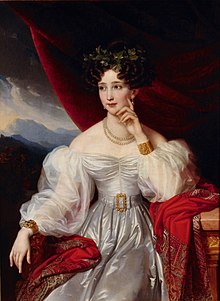Sophie of Bavaria
| Archduchess Sophie | |||||
|---|---|---|---|---|---|
 |
|||||
| Born |
27 January 1805 Munich, Electorate of Bavaria |
||||
| Died | 28 May 1872 (aged 67) Vienna, Empire of Austria |
||||
| Burial | Imperial Crypt | ||||
| Spouse | Archduke Franz Karl of Austria | ||||
| Issue | |||||
|
|||||
| House | Wittelsbach | ||||
| Father | King Maximilian I Joseph of Bavaria | ||||
| Mother | Princess Caroline of Baden | ||||
| Full name | |
|---|---|
| Sophie Friederike Dorothea Wilhelmine |
Princess Sophie of Bavaria (Sophie Friederike Dorothea Wilhelmine; 27 January 1805 – 28 May 1872) was born to King Maximilian I Joseph of Bavaria and his second wife Caroline of Baden. She was the identical twin sister of Princess Maria Anna of Bavaria, Queen of Saxony as wife of Frederick Augustus II of Saxony. Her eldest son Franz Joseph reigned as Emperor of Austria, and King of Hungary; her second son Maximilian reigned as Emperor of Mexico.
On 4 November 1824, she married Franz Karl, Archduke of Austria. Her paternal half-sister, Caroline Augusta of Bavaria, had married the groom's widowed father, Francis II, in 1816. Sophie and Franz Karl had six children.
Her ambition to place her oldest son on the Austrian throne was a constant theme in Austrian politics. At the time she was called "the only man at court". During the Revolution of 1848, she persuaded her somewhat feeble-minded husband to give up his rights to the throne in favour of their son Franz Joseph. After Franz Joseph's accession, Sophie became the power behind the throne. Historically, Sophie is remembered for her extremely controlling relationship with Franz Joseph's wife Sisi, who was also her niece.
Sophie kept a detailed diary most of her life, which reveals much about Austrian court life. She was deeply affected in 1867 by the execution in Mexico of her second son Maximilian. She never recovered from that shock, and withdrew from public life. She died of a brain tumor in 1872.
...
Wikipedia
